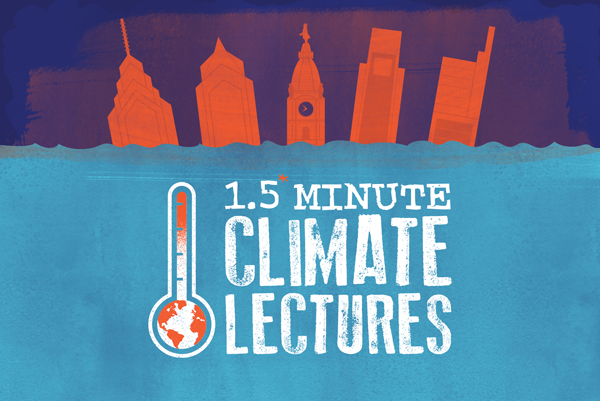1.5 Minute Climate Lectures to sound the alarm about the climate emergency, to call for large-scale climate action, and to share a vision of constructive and comprehensive response.

1.5 Minute Climate Lectures to sound the alarm about the climate emergency, to call for large-scale climate action, and to share a vision of constructive and comprehensive response.

The 1.5* Minute Climate Lectures return as part of Climate Week at Penn. Professors and leaders from across the University unite in a series of virtual lectures to sound the alarm about the climate emergency, to call for large-scale climate action, and to share a vision of constructive and comprehensive response.
*The maximum amount the average temperature can rise in order to avoid the worst consequences of global warming is 1.5°C. We’re already past 1°C.
The 1.5* Minute Climate Lectures return as part of Climate Week at Penn. Professors and leaders from across the University unite in a series of virtual lectures to sound the alarm about the climate emergency, to call for large-scale climate action, and to share a vision of constructive and comprehensive response.
*The maximum amount the average temperature can rise in order to avoid the worst consequences of global warming is 1.5°C. We’re already past 1°C.
The 1.5* Minute Climate Lectures return as part of Climate Week at Penn. Professors and leaders from across the University unite in a series of virtual lectures to sound the alarm about the climate emergency, to call for large-scale climate action, and to share a vision of constructive and comprehensive response.
*The maximum amount the average temperature can rise in order to avoid the worst consequences of global warming is 1.5°C. We’re already past 1°C.
The 1.5* Minute Climate Lectures return as part of Climate Week at Penn. Professors and leaders from across the University unite in a series of virtual lectures to sound the alarm about the climate emergency, to call for large-scale climate action, and to share a vision of constructive and comprehensive response.
*The maximum amount the average temperature can rise in order to avoid the worst consequences of global warming is 1.5°C. We’re already past 1°C.
The 1.5* Minute Climate Lectures return as part of Climate Week at Penn. Professors and leaders from across the University unite in a series of virtual lectures to sound the alarm about the climate emergency, to call for large-scale climate action, and to share a vision of constructive and comprehensive response.
*The maximum amount the average temperature can rise in order to avoid the worst consequences of global warming is 1.5°C. We’re already past 1°C.
Karen Holdberg, Vagelos Professor in Energy Research
Faculty and students from across the University of Pennsylvania unite in a series of 1.5 Minute Climate Lectures to sound the alarm about the climate emergency, to call for large-scale climate action, and to share a vision of constructive and comprehensive response. The maximum amount the average temperature can rise in order to avoid the worst consequences of global warming is 1.5°C. We’re already past 1°C.
Frederick Steiner, Dean of Stuart Weitzman School of Design and Paley Professor and Co-Executive Director, The McHarg Center
Faculty and students from across the University of Pennsylvania unite in a series of 1.5 Minute Climate Lectures to sound the alarm about the climate emergency, to call for large-scale climate action, and to share a vision of constructive and comprehensive response. The maximum amount the average temperature can rise in order to avoid the worst consequences of global warming is 1.5°C. We’re already past 1°C.
Faculty and students from across the University of Pennsylvania unite in a series of 1.5 Minute Climate Lectures to sound the alarm about the climate emergency, to call for large-scale climate action, and to share a vision of constructive and comprehensive response. The maximum amount the average temperature can rise in order to avoid the worst consequences of global warming is 1.5°C. We’re already past 1°C.
Visit the series website
Tom Daniels, Professor of City and Regional Planning